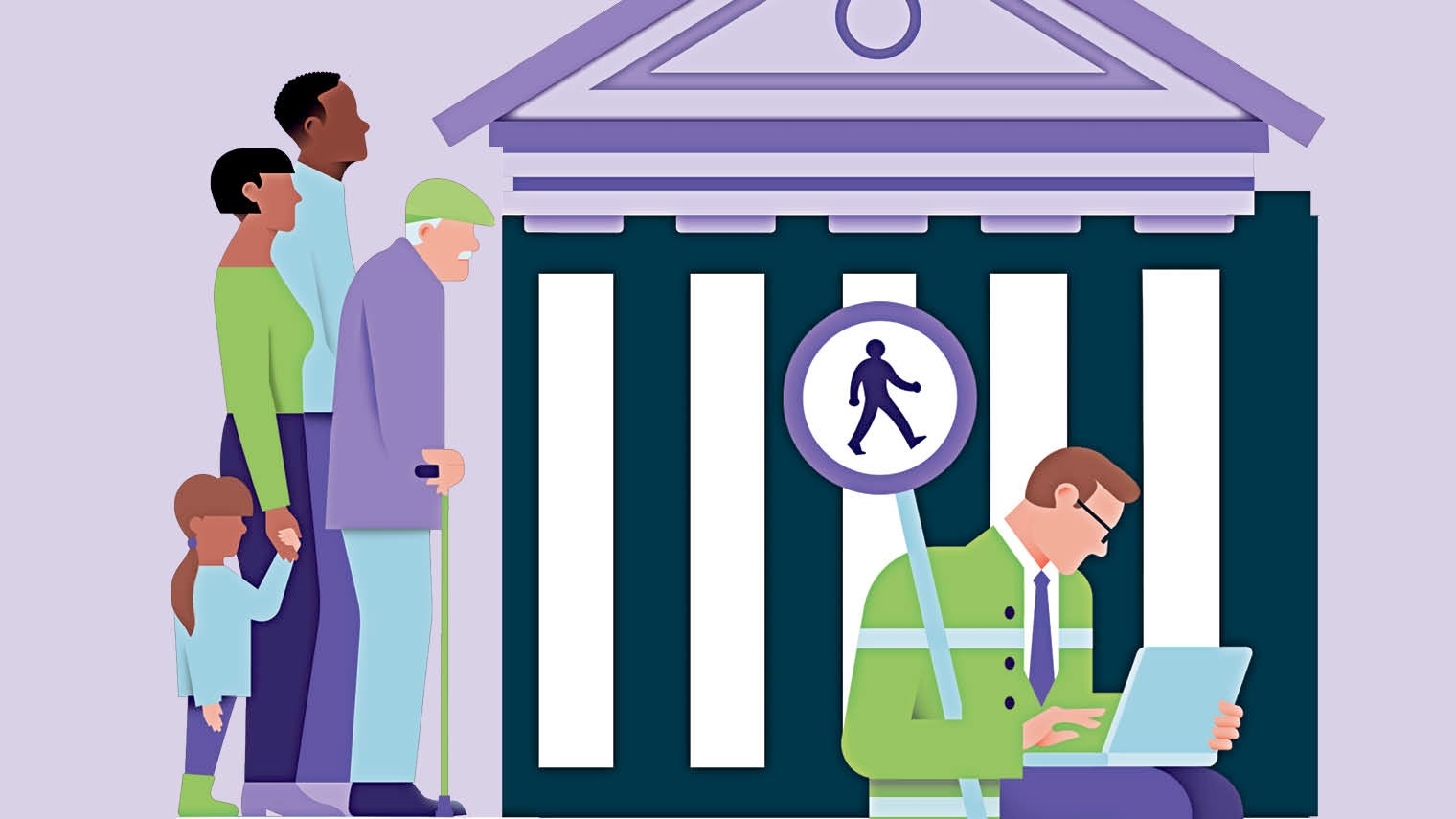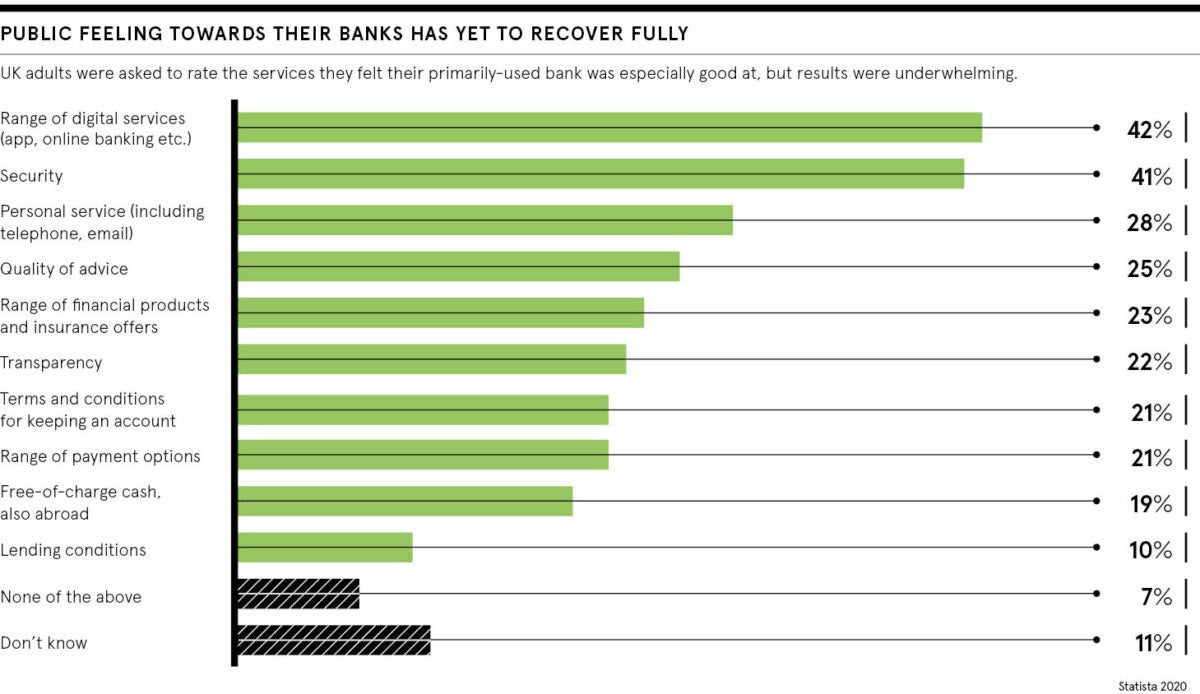
Twelve years on from the global financial crisis, you might anticipate bankers have developed higher levels of empathy with the British public. After all, in 2008, it was the taxpayer who footed the bill for propping up fallen giants such as Royal Bank of Scotland and Lloyds Banking Group.
In early-2020, as coronavirus started to wreak havoc on the UK economy, many were seeking payback. They wanted to see banks undertake a moral duty to support society and help industrial sectors that had been hit by the pandemic.
“The UK government bailed out the banks to the tune of £500 billion in the 2008 financial crisis. The UK taxpayer took the brunt of this and arguably is still paying for it today,” says Richard Skellett, founder of charity Digital Anthropology.
“Despite this support, I would argue the banks have little or no relationship with their customers. Banks have lost their way, starting with removing authority from bank managers.”
The view that banks owe something to the British people has undoubtedly become more widespread over the past decade. Benedict Ireland, head of experience at Splendid Unlimited, is among them.
Banks have lost their way, starting with removing authority from bank managers
Having worked with HSBC extensively, he believes the banks that have invested in digital tools in the years leading up to the pandemic are ultimately those able to help the most, particularly given the increased digital migration of customers since the start of the outbreak.
“Banks should have a moral obligation to help customers cope financially,” says Skellett. “They need to have a ‘human understanding’ approach. This means enabling people to budget better, manage their bills and maintain their mortgages.”
Are banks getting better at supporting customers?
Despite this, those who have been working in partnership with the banks in recent years say while attitudes within these organisations have shifted – they do want to help – their systems and technologies have limited their ability to respond adequately to the issues presented by the pandemic.
“Banks have a generational opportunity to truly support customers through an unprecedented crisis, but years of inaction on creaking infrastructure is thwarting best intentions to protect lives and livelihoods,” says from Simon Wilson, director of global payments solutions at Icon Solutions, which has been working with HSBC and Lloyds Banking Group, among other well-known European banking giants.

Wilson says the banks are doing everything they can to support people who have been hit financially by COVID-19, but the speed of their response has been undermined by lacklustre digital innovation in the years leading up to the pandemic.
“At a time where customers have necessarily embraced digital platforms and need personalised, immediate and reliable services to meet their unique and rapidly changing circumstances, legacy systems that are inflexible, expensive and inhibit innovation just no longer cut it,” he says.
Transformation must be a priority, but this is easier said than done. “With customers needing support now and internal resources under pressure, transformations that have historically been risky and take years are a hard sell,” says Wilson.
What’s holding banks back from digital transformation?
So why are banks so slow to embrace digital transformation? And has this lack of transformation in the years prior to COVID-19 harmed their ability to help society now?
Fabrice Gouttebroze, managing director of Sirma Group’s S&G Technology Services, says the industry is “notoriously change averse” because of its laser-like focus on trend analysis and modelling.
“The entire ethos of the industry is predicated on the assumption that analysis, and modelling based on experience, are key success factors for a bank,” says Gouttebroze. “This, by far, trumps innovation and change. As a result, it tends to get caught and paralysed by unforeseen events.”
Given the widespread criticism of the banks for not translating innovation into social action, it is easy to forget that three years ago the Competition and Markets Authority outlined the Open Banking programme. The project was designed to free up the data held by banks to stimulate innovation, enhance competition and allow new challengers into the market. It was also supposed to lead to an explosion of new services.
There is some evidence that this has worked, however. Non-bank entities, which compete with the legacy high street banking cohort, have stepped up during the pandemic, offering individuals and businesses speedy access to loans, new accounts and payment services. But, crucially, there has been limited help for those with the greatest need.
“There has been no shortage of new money management and investment apps, but precious little for other business sectors or people who aren’t already affluent, sophisticated investors,” says Sara Korchmaros, chief commercial officer at retail technology platform Recash.
“As a result, the original vision for Open Banking – to extend the benefits to other sectors – has remained largely unfulfilled.”
Other ways that banks can help
While this assessment of Open Banking’s success may be justified, it does not tell the full story of innovation across the UK banking sector more broadly. In reality, banks have been helping society in dozens of other ways.
“There have been some great examples of banks supporting their customers during the pandemic, offering multiple mortgage holidays, removing overdraft fees, keeping branches open and even providing helplines to provide expert help,” says Kam Chana, product innovation director at Temenos. “These are all valuable, but more can be done.”
Gretel, a company that specialises in reuniting individuals with cash in accounts they have forgotten about, says one step would be to raise awareness about the £50 billion in assets that is currently scattered throughout the financial services industry unclaimed.
“Over 20 million people aren’t aware of the dormant assets they have sitting in forgotten accounts and investments,” says Duncan Stevens, the company’s chief executive. “Imagine the impact if people could be reunited with that money.”
While there is a “moral imperative on banks to support the global economy”, Stevens says the requirement should be broader. “The responsibility to support lies with all financial services providers to make accessibility to this money as quick and simple as possible in light of the financial impact of the pandemic,” he says.

Twelve years on from the global financial crisis, you might anticipate bankers have developed higher levels of empathy with the British public. After all, in 2008, it was the taxpayer who footed the bill for propping up fallen giants such as Royal Bank of Scotland and Lloyds Banking Group.
In early-2020, as coronavirus started to wreak havoc on the UK economy, many were seeking payback. They wanted to see banks undertake a moral duty to support society and help industrial sectors that had been hit by the pandemic.
